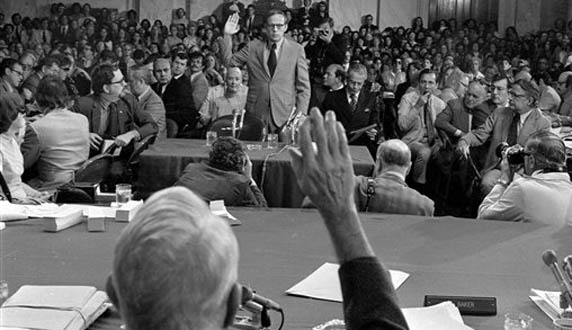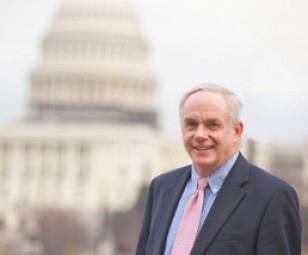
The Watergate hearings in the summer of 1973 led eventually to the resignation of President Richard Nixon. Many Republicans are hoping President Barack Obama’s current troubles will end up the same way. Photo: AP
Hijacked by Hearings
This could be it. How the Obama White House copes with the next few months could determine whether the president and his people will have a successful second four year term. If they don’t weather it well, they risk falling in line behind the other recent two-term presidents who lost their way after re-election.
It looks like a busy summer. Several congressional committees are looking into the scandal involving the Internal Revenue Service — the IRS, targeting conservative groups that had applied for tax exempt status. We can also expect more on the Benghazi affair from last September when four Americans, including the U.S. Ambassador to Libya, Chris Stevens, were killed in a terrorist attack. And lawmakers are also looking into the Justice Department’s decision to secretly access the records of 20 Associated Press phone lines in connection with a leak investigation of a foiled al-Qaida plot to attack a U.S.-bound airliner.
But of the three “scandals” or “controversies” or whatever you want to call them, clearly the most dangerous for the White House is the IRS affair. So far there has been nothing to suggest that President Obama was aware of what was going on when conservative Tea Party groups were being targeted, supposedly by low-level IRS functionaries. Republicans will push as hard as they can to find any shard of evidence that White House higher-ups knew something about the IRS activity. We can expect this will involve weeks, if not months, of hearings by committees from both the Republican-controlled House of Representatives and the Democratically-controlled Senate.
Political Consequences
So far, some recent public opinion polls suggest the accumulation of problems is not doing much political harm to the president, at least not yet. A recent CNN-ORC poll found his approval rating at 53 percent, while a Washington Post-ABC News poll had him at 51 percent positive. This could change over time, especially if new revelations emerge about the IRS scandal that would more closely tie the White House to abuses. But so far that is not happening.

President Obama is holding his own in the public opinion polls despite his latest batch of troubles. Photo: AP
Polls show both Republicans and Democrats are disturbed by the IRS targeting conservative groups, and this is the scandal that clearly presents Republicans with an opportunity to make political hay. But the stable numbers on the president’s approval ratings also suggest the improving economy is providing Mr. Obama with an underpinning of support that may not be easily chipped away.
Polling also shows the public remains split on the Benghazi controversy, with Republicans much more willing to believe that the administration is at fault in some way than Democrats. As for the story about the Justice Department accessing phone records on the Associated Press, the public seems to have a balanced view about protecting the rights of the free press and ensuring that leaks are pursued if they could be harmful to national security.
For the president, the likely effect of extended congressional investigations is freezing his agenda in place. Gun control was already on the back burner after a bill to expand background checks failed to advance in the Senate. Now the question is whether all the focus on the IRS scandal and other two controversies will deal a fatal blow to bipartisan efforts to craft a comprehensive immigration bill. They might not. Enough Republicans realize they must do something to change their image with Hispanic voters, though they are mainly in the Senate.
Later this year Congress and the White House will have to revisit raising the debt limit, and there is still the issue of what to do about the budget and sequester cuts once the 2013 budget year ends on September 30th. Will a prolonged battle over IRS allegations help or hurt the prospect for cooperation on issues like these? Hard to see how they will help, that’s for sure.
Tea Party on Boil
I note that Virginia Republican leaders made several references to the IRS scandal at their state convention in Richmond, the state capital. Every time the issue was brought, up it sparked roars of approval from the crowd. This IRS thing has handed Republicans a custom-made issue on a silver platter. I can’t think of better way to rile up Tea Party folks who were depressed following last year’s election than to hand them evidence that the government led by Barack Obama was, in fact, targeting them for special treatment because of their political beliefs. I can’t tell you how many times I used to hear such sentiments at Tea Party rallies over the past few years, claims that most fair-minded people would dismiss out of hand. Now they get to run around and scream, “I told you so!” while they wave their flags and strut around in their colonial costumes.
And all of this comes just in time for the 2014 midterm elections. The Tea Party people made their first major showing in the 2010 midterms, helping Republicans take back control of the House. Now the IRS scandal threatens to be the fuel that helps turn out loads of conservative activists next year eager to deal a punishing blow to an administration desperate to do something big in its second term.
We can expect that the Republicans will slowly build off the hearings and investigations in Washington and will do everything they can to fire up a conservative base that became disillusioned after President Obama easily won a second term last November. Republicans in Congress may not seem eager to work with Democrats, but they do know how to take an issue like the IRS and ground their opponents into dust come November of 2014.
Republicans Love to Overreach
There is a battle already going on among Republicans who want to pursue both the IRS and Benghazi stories. Some of the cooler heads like the congressional leadership are urging some of the more hotheaded members to just focus on the facts and not get ahead of themselves by comparing the controversies to past scandals, including Watergate.

Tea Party conservatives such as Congresswoman Michele Bachmann are hoping the president’s troubles will block his agenda on taxes, medical care and other issues. Photo: AP
But they are having a hard time getting everyone on the same page. Some of the high profile conservatives in the House such as Steve King of Iowa and Michele Bachmann of Minnesota have already accused the White House of orchestrating a cover up on some of these issues, and of outright lying to the public. Many Democrats believe it’s only a matter of time before more Republicans start mentioning the possibility of impeachment, dredging up memories of going after President Bill Clinton in 1998 over the Monica Lewinsky affair.
The real question is whether Republicans can convince anyone beyond their own circle that the president needs to pay a political price for these controversies. The right wing talk show echo chamber is already working overtime hammering away at the White House on all these issues. But it will take some as yet unknown revelation concerning the IRS before the political consequences reach anything close to a critical mass.
Another Watergate Summer?
I remember being riveted by the Watergate hearings in the summer of 1973. The testimony before the Senate Select Committee unfolded like a mystery novel, complete with all kinds of quirky characters and that includes senators, White House witnesses and assorted oddballs.
But looking back, I remember having this strong sense that layers of a scandal were being peeled away and that it was going to lead to something big. Nobody at that point knew how big, of course.

President Nixon flashes the V-for-victory sign and waves goodbye to his staff August 9, 1974 after the Watergate scandal forced his resignation. Photo: AP
I was about to begin my freshman year at college and President Richard Nixon was not popular among younger people at that time, mainly because of his lengthy quest to find “peace with honor” in Vietnam. To many people, that seemed an excuse to prolong the war.
But as details emerged at the Watergate hearings of Nixon campaign attempts to go after Democratic candidates like Ed Muskie, Hubert Humphrey and Ted Kennedy, Watergate took a new meaning. Never before had Americans been exposed to the details of such a widespread effort to discredit the president’s political opponents. What also struck me then, and even more so now, is how relatively even-handed the committee conducted the investigation, especially compared to say, the Clinton impeachment hearings by the Republican-controlled House in 1998.
To be sure, the Watergate hearings had plenty of partisan moments but overall, it came off to the public more as a bipartisan search for the facts. There were plenty of moments of drama during the hearings, such as Nixon White House counsel John Dean testifying that he told the president that the Watergate cover-up was like a “cancer” growing on the presidency. And who could forget when White House aide Alexander Butterfield disclosed the existence of an Oval Office taping system that in many ways would lead to Nixon’s ultimate downfall. But beyond the drama, you sense the public had confidence in the investigation and that elected members of Congress were, for the most part, interested in finding out facts more than political grandstanding.
So Far Watergate is a Stretch
At the moment, we’re a long way from anything approaching Watergate. The White House has acknowledged that some aides were told weeks ago about the IRS abuses, but they are adamant that no one told the president. The explanation is that the inspector general’s report on the matter was not complete and they wanted to wait for that before telling the president. You can bet this will be a key point of inquiry during the upcoming “summer of hearings.”
It’s more likely that the Obama White House will have to confront the kind of political challenges faced by many second term predecessors who found themselves on the defensive at a time when they had hoped to maximize their political capital and work on legacy achievements. At the rate things are going now, getting some sort of immigration reform compromise through Congress in the midst of these investigations and sharp partisan warfare would rank as a major achievement.


3 responses to “Obama’s Summer of Discontent”
[…] Voice of America (blog) […]
[…] Obama’s Summer of Discontent USA Politics […]
Just wondering why this story…